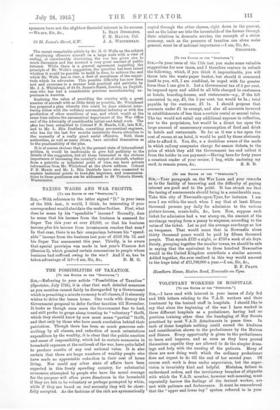THE POSSIBILITIES OF TAXATION.
[To THE EDITOR Or THE "SPECTATOR."] SIR,—Referring to your article "Possibilities of Taxation" (Spectator, July 17th), it is clear that such detailed measures as you mention cannot fairly be disregarded by a Government which is preaching a minute economy to all classes, if it sincerely wishes to drive the lesson home. One reads with dismay the Government proposal to defer further taxation till November. It looks as though once more the Government fear to lead, and still prefer to grope along trusting to " voluntary " thrift, which they should know by now must mean "partial" thrift, and that only by those who have much resolution behind their patriotism. Though there has been so much generous sub- scribing by all classes, and reduction of much ostentatious expenditure by the wealthy, it is clear that the public emotion and sense of responsibility, which led to certain economies in household expenses at the outbreak of the war, have quite failed to produce results of any real national value. It is also certain that there are large numbers of wealthy people who have made no appreciable reduction in their cost of home living. Nor could any other state of affairs have been expected in this freely spending country, for substantial economies attempted by people who have the moral courage for the purpose will often prove disastrous in the household if they are felt to be voluntary or perhaps prompted by whim, while if they are based on real necessity they will be cheer- fully accepted. As the fashions of the rich are systematically
copied through the other classes, right down to the poorest, and as the latter see into the households of the former through their relatives in domestic service, the example of a strict economy, such as the pressure of taxation can alone make general, must be of national importance. —I am, Sir, &c., ONLOOKER.


































 Previous page
Previous page